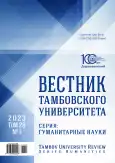Information and communication technologies in the educational process of Baranovichy State University and Derzhavin Tambov State University
- Authors: Andryiashkа M.V.1, Zelepukin R.V.2
-
Affiliations:
- Baranavichy State University
- Derzhavin Tambov State University
- Issue: Vol 28, No 1 (2023)
- Pages: 7-23
- Section: PEDAGOGY OF HIGHER EDUCATION
- URL: https://journal-vniispk.ru/1810-0201/article/view/297896
- DOI: https://doi.org/10.20310/1810-0201-2023-28-1-7-23
- ID: 297896
Cite item
Full Text
Abstract
The information and communication technologies used in the educational process of Baranovichy State University and Derzhavin Tambov State University are described. Wide methodological toolkit was used: general logical methods of cognition (analysis, synthesis, abstraction, deduction, induction, analogy, modeling); empirical methods (description, comparison, own observation of information and educational technologies of Baranovichy State University and Derzhavin Tambov State University); private scientific methods (cybernetic, axiological, synergetic, in particular, the method of content analysis of the content of the information and educational environment of the two universities); special methods (the method of comparative analysis, formal legal method, method of legal hermeneutics). It was established that the development of information and communication technologies is directly influenced by a complex of modern challenges and threats. The conclusion is made about the positive effect of the participation of universities in specialized support programs, the participation of Derzhavin Tambov State University in the Priority 2030 program is given as an example. Attention is focused on the development of information and communication technologies products in the context of expanding the conditions for the education of persons with disabilities. The application of the obtained results is assumed in three directions: theoretical (continuation of research), normative (development of proposals aimed at improving legislation) and utilitarian (application in the educational process). The originality and scientific novelty of the work are revealed in the results of the analysis and comparison of the content of information and educational technologies of two partner universities – Baranovichy State University and Derzhavin Tambov State University. Research data and its results can form the basis of individual transformations accompanying educational activities, as well as serve as a theoretical basis for further research in the field of information technology in the research and educational space.
About the authors
M. V. Andryiashkа
Baranavichy State University
Email: andryiashkomv@mail.ru
ORCID iD: 0000-0003-2527-2224
Cand. Sci. (Law), PhD, Associate Professor, Associate Professor of General Legal Disciplines and Public Administration Department
21 Voykova St., Baranovichi, 225405, Republic of BelarusR. V. Zelepukin
Derzhavin Tambov State University
Author for correspondence.
Email: lexcomlex@yandex.ru
ORCID iD: 0000-0002-0307-4385
Cand. Sci. (Law), Associate Professor, Associate Professor of Constitutional and International Law Department
33 Internatsionalnaya St., Tambov, 392000, Russian FederationReferences
- Abdalina L.V., Zykov K.A. (2022). Digital deviation as a modern world phenomenon. Psikhologo-pedagogicheskii zhurnal «Gaudeamus» = Psychology-Pedagogical Journal Gaudeamus, vol. 21, no. 4, pp. 85-95. (In Russ.) https://doi.org/10.20310/1810-231X-2022-21-4-85-95, https://elibrary.ru/lkpxtq
- Zagoskina I.V., Korotenko T.N. (2022). Distance learning features in university as a vector of modern education development. Psikhologo-pedagogicheskii zhurnal «Gaudeamus» = Psychology-Pedagogical Journal Gaudeamus, vol. 21, no. 2, pp. 51-59. (In Russ.) https://doi.org/10.20310/1810-231X-2022-21-2-51-59, https://elibrary.ru/tmzjau
- Kochukova O.N. (2022).Information model of development indicators and levels of divergent thinking among university students. Psikhologo-pedagogicheskii zhurnal «Gaudeamus» = Psychology-Pedagogical Journal Gaudeamus, vol. 21, no. 4, pp. 31-40. (In Russ.) https://doi.org/10.20310/1810-231X-2022-21-4-31-40
- Larionova T.V., Filippenko L.K. (2022). Information and communications technology in the educational process of primary school: impact on schoolchildren. Psikhologo-pedagogicheskii zhurnal «Gaudeamus» = Psychology-Pedagogical Journal Gaudeamus, vol. 21, no. 1, pp. 78-87. (In Russ.) https://doi.org/10.20310/1810-231X-2022-21-1-78-87, https://elibrary.ru/ijwknn
- Titarenko L.G. (2022). Digitalisation of learning: a driving force for higher education modernisation or a huma-nitarian threat? Zhurnal Belorusskogo gosudarstvennogo universiteta. Sotsiologiya = Journal of the Belarusian State University. Sociology, no. 1, pp. 33-41. (In Russ.) https://doi.org/10.33581/2521-6821-2022-1-33-41, https://elibrary.ru/ggkhat
- Titarenko L.G. (2022). Adaptation to accelerated digitalization in the context of a pandemic: comparative study of higher education systems in Russia and Belarus. Vysshee obrazovanie v Rossii = Higher Education in Russia, vol. 31, no. 3, pp. 58-68. (In Russ.) https://doi.org/10.31992/0869-3617-2022-31-3-58-68, https://elibrary.ru/jxbvqk
- Golovenchik G.G. (2020). Current trends in digital education reform. Tsifrovaya transformatsiya = Digital Transformation, no. 4, pp. 5-20. (In Russ.) https://doi.org/10.38086/2522-9613-2020-4-5-20, https://elibrary.ru/tvwmlt
- Lozitskii V.L. (2019). Stanovlenie i evolyutsiya institutsional’noi modeli universiteta 3.0 v epokhu tsifrovizatsii [Formation and evolution of the institutional model of the University 3.0 in the era of digitalization]. In: A.B. Belskii (executive ed.). Sbornik materialov 2 mezhdunarodnoi nauchno-prakticheskoi konferentsii «Tsifrovaya transformatsiya obrazovaniya» [Proceedings of the 2nd International Scientific and Practical Conference “Digi-tal Transformation of Education”]. Minsk, The Main Information and Analytical Center of the Ministry of Edu-cation of the Republic of Belarus, pp. 290-293. (In Russ.) https://elibrary.ru/yxngys
- Khramtsova F.I., Vasilchenko N.V. (2020). Features of digitalization of additional education of children and youth in the Republic of Belarus. Mezhdunarodnyi zhurnal gumanitarnykh i estestvennykh nauk = International Journal of Humanities and Natural Sciences, no. 5-2 (44), pp. 134-140. (In Russ.) https://doi.org/10.24411/2500-1000-2020-10517, https://elibrary.ru/jmqekz
Supplementary files








